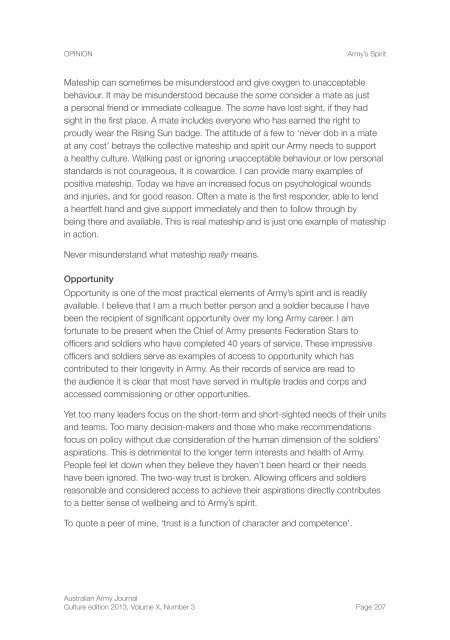Australian Army Journal
Australian Army Journal
Australian Army Journal
Create successful ePaper yourself
Turn your PDF publications into a flip-book with our unique Google optimized e-Paper software.
OPINION<br />
<strong>Army</strong>’s Spirit<br />
Mateship can sometimes be misunderstood and give oxygen to unacceptable<br />
behaviour. It may be misunderstood because the some consider a mate as just<br />
a personal friend or immediate colleague. The some have lost sight, if they had<br />
sight in the first place. A mate includes everyone who has earned the right to<br />
proudly wear the Rising Sun badge. The attitude of a few to ‘never dob in a mate<br />
at any cost’ betrays the collective mateship and spirit our <strong>Army</strong> needs to support<br />
a healthy culture. Walking past or ignoring unacceptable behaviour or low personal<br />
standards is not courageous, it is cowardice. I can provide many examples of<br />
positive mateship. Today we have an increased focus on psychological wounds<br />
and injuries, and for good reason. Often a mate is the first responder, able to lend<br />
a heartfelt hand and give support immediately and then to follow through by<br />
being there and available. This is real mateship and is just one example of mateship<br />
in action.<br />
Never misunderstand what mateship really means.<br />
Opportunity<br />
Opportunity is one of the most practical elements of <strong>Army</strong>’s spirit and is readily<br />
available. I believe that I am a much better person and a soldier because I have<br />
been the recipient of significant opportunity over my long <strong>Army</strong> career. I am<br />
fortunate to be present when the Chief of <strong>Army</strong> presents Federation Stars to<br />
officers and soldiers who have completed 40 years of service. These impressive<br />
officers and soldiers serve as examples of access to opportunity which has<br />
contributed to their longevity in <strong>Army</strong>. As their records of service are read to<br />
the audience it is clear that most have served in multiple trades and corps and<br />
accessed commissioning or other opportunities.<br />
Yet too many leaders focus on the short-term and short-sighted needs of their units<br />
and teams. Too many decision-makers and those who make recommendations<br />
focus on policy without due consideration of the human dimension of the soldiers’<br />
aspirations. This is detrimental to the longer term interests and health of <strong>Army</strong>.<br />
People feel let down when they believe they haven’t been heard or their needs<br />
have been ignored. The two-way trust is broken. Allowing officers and soldiers<br />
reasonable and considered access to achieve their aspirations directly contributes<br />
to a better sense of wellbeing and to <strong>Army</strong>’s spirit.<br />
To quote a peer of mine, ‘trust is a function of character and competence’.<br />
<strong>Australian</strong> <strong>Army</strong> <strong>Journal</strong><br />
Culture edition 2013, Volume X, Number 3 Page 207

















